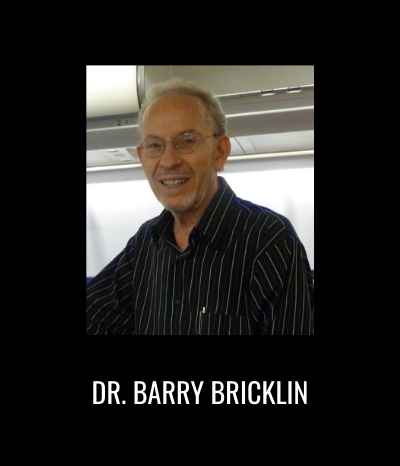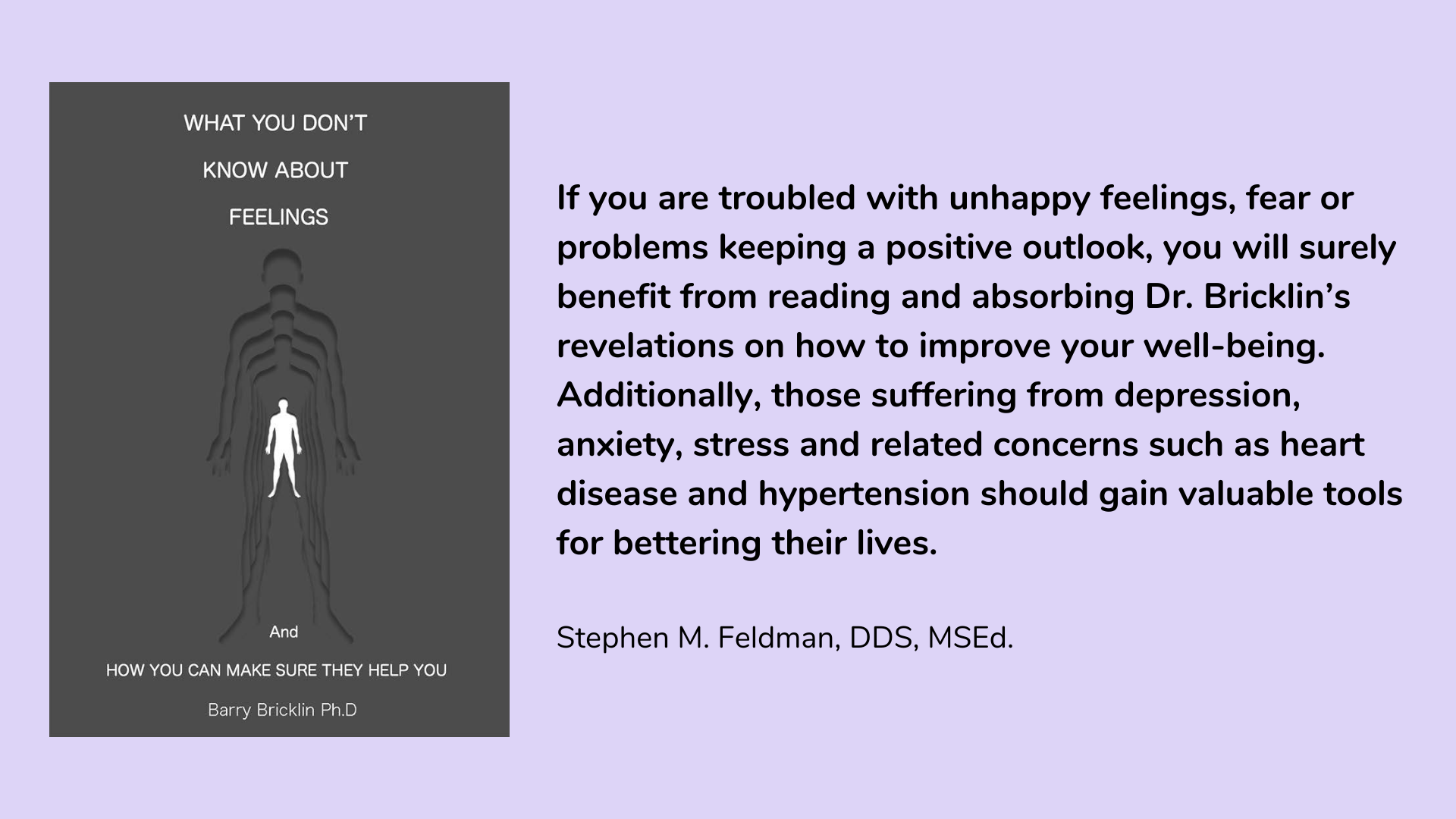Interview with Barry Bricklin, Ph.D.
A Clinical-Forensic Psychologist at Bricklin Associates, Barry Bricklin, Ph.D., served on the faculty and/or lectured at Jefferson Medical College, Hahnemann Medical College, Widener University, Temple University, and Johns Hopkins University, teaching psychotherapeutic, psycho-diagnostic and forensic procedures.
Dr. Bricklin is the author of dozens of books, book chapters, and articles on psychology, psychotherapy, marriage problems, child custody issues and neuroscience. Several of his books have been translated into multiple languages.
Q & A
I loved reading about your wonderfully diverse work-history. Which of your early job roles taught you the most about psychology and human behavior?
My Dad’s closest friend ran a detective agency. He hired me when I was 16 years old to secretly spy on his real detectives to see if they were in their assigned locations---spots where they could gather evidence on husbands or wives suspected of cheating. Most of them stayed in their assigned locations only 10 or 15 minutes but put in long reports, mostly fabricated, like they’d been on the job for hours. Cameras were not very good in those days, around 1949, so the photos were grainy and useless. I learned that good people too easily take advantage of others when it’s easy for them to do it. On another job, working at city-owned recreation centers for so-called “troubled youth,” I learned that kids, no matter their backgrounds, deeply and genuinely appreciate efforts they see as sincere and caring---things like getting them baseball uniforms, managing games, driving 10 of them at a time to their games jammed into my 1947 Dodge, an activity I’d be arrested for nowadays. I stayed friends with them for years to come.
Along with your wife, you hosted a call-in radio and TV show, where you talked about psychological issues. During the 18 years you were on air, what would say were the most common issues you addressed?
Wives complaining about husbands, and both complaining about their kids. My wife and I were among the very first to develop the use of a Family Council, a way to improve communication between husbands, wives and kids. We were on CBS. We offered our listeners a booklet on the Council. The station wanted to charge 50-cents for each. People would scotch-tape 5 dimes onto 3 x 5 cards. It took 5 minutes each to peel tape off dimes or quarters and nickels from 500,000 cards. Tape was gooey and sticky then. CBS ended up with millions of glue-covered coins. I take pride in having taught CBS and me a lesson: Sometimes it’s cheaper to just give things away free.
What sparked your passion for sharing fascinating facts discovered by research in neuroscience?
For years it seemed to me that people in psychology were like people who owned cars but refused to lift the hoods to see what was going on inside of them. It was like “Hey, I’ll observe how the car behaves; I don’t have to see what’s going on with the engine, the pistons, the belts---with all the things that make the car work.” Today, some are finally willing to lift the hoods.
Whose work in the field of neuroscience has influenced you the most?
Antonio Damasio. I think he does the best job of linking his conclusions to the evidence. And the evidence comes from every source available: biology, physiology, histology, evolution, psychology, the history of living things, cultural history---everywhere. Lisa Feldman Barrett does a great job of explaining how words and the structure of language influence the way feelings are actually experienced. Donald Hoffman’s book, The Case Against Reality, is mind-blowing. People have no idea of how little they see of reality---or even what we can possibly mean by the term “reality.”
What does neuroscience have to tell us about the effects of social distancing and self-isolation?
Social interactions in the flesh protect people from emotional distress, cognitive decline, and physical disability. People actually like to physically huddle when they’re scared. Loneliness and social isolation are both associated with poor quality of life. A new study linked COVID-19-based loneliness in older adults with elevated symptoms of anxiety, depression, and trauma. On the positive side, researchers know for sure that exposure to nature improves mental well-being. Spend as much time as you can in woods and large parks.
Having written widely on the subject, what would you say is the most compelling research-based reason music has such a profound effect on feelings?
The elements of music---rhythm, melody, harmony, timbre, dynamics, texture, and form---are Ideal for representing feelings. The levels of excitement in shifting rhythms and dynamics, and of beauty, happiness and sadness in melody, harmony, timbre and texture, are ideal ways to create exactly the companionship you seek at any moment of your life, from empathy to funny and giddy. Further, like food and money, music activates the pleasure and reward systems. Music reduces stress by optimizing biological functions like heart rates, and activates brain areas that control movement, planning, attention and memory---all of which is invigorating.
To understand why music is so critical to human happiness you also have to understand that human brains are prediction machines. Feldman Barrett thinks making predictions is the main reason we have brains---mainly to predict upcoming energy needs. Another neuroscientist believes we have to accurately predict upcoming movements. If we don’t know where we’re going next, it would be impossible to know how to position our bodies right now. Music is an ideal platform for confirming predictions. When we listen to music we are unconsciously making continual predictions. When our predictions about melodies and lyrics come true, we are rewarded by a release of dopamine. This explains why jazz never produces top-10 hits. The progression of the music is unpredictable. Music offers continual mind-body rewards for sharpening our predictive skills.
What can readers expect from your latest book 'What You Don't Know About Feelings: And How You Can Make Sure They Help You'?
How feelings can be deliberately accessed that sustain good feelings, upgrade thought processes, increase motivation or diminish it for dieting or drug-addiction purposes, enhance the number and variety of consciously available ideas, improve multiple-perspective thinking, heighten creativity, upgrade pattern recognition, create mental states that feature calm, unbiased, empathic attention, interest and curiosity---ideal for decision-making and mindfulness practices.
What's the difference between feelings and emotions?
Emotions are innate biological reactions. Feelings are the felt mental and conscious representations of emotions. They go from good to bad, and vary in intensity. Feelings let us know when we are in the presence of good choices versus bad choices. We have to learn when we should act on them and when we’d be better off if we didn’t. A lot of us aren’t too good with this step.
In reviewing your book, professor of neuropsychology, Dr. Kenneth Goldberg, describes it as "a paradigm shift toward scientifically validated neuroscientific principles". To what extent is psychotherapy beginning to embrace these principles?
Many are realizing that insights into the causes of negative states are of limited value in changing bad thoughts, behaviors and feelings into positive ones. You can have great insight Into the cause of a puddle of water on your living room floor, but that doesn’t change your need for somebody who knows how to repair a broken pipe. In therapy that’s equivalent to somebody who can effectively change neural wiring sequences.
What projects are you working on at the moment?
My next book is called The Art of The Rant: How to Make Them Pay Off. I’m writing it with a friend who’s angry at everything. Most people just rant. They think it helps when you scream either out loud or to yourself. There’s actually a best way to rant, out loud or inwardly.
Connect With Dr. Barry Bricklin
Connect With Dr. Bricklin on LinkedIn
know someone who would be interested in reading this interview? Share this page with them.
Go Back To The Psychology Expert Interviews Page





New! Comments
Have your say about what you just read! Leave me a comment in the box below.